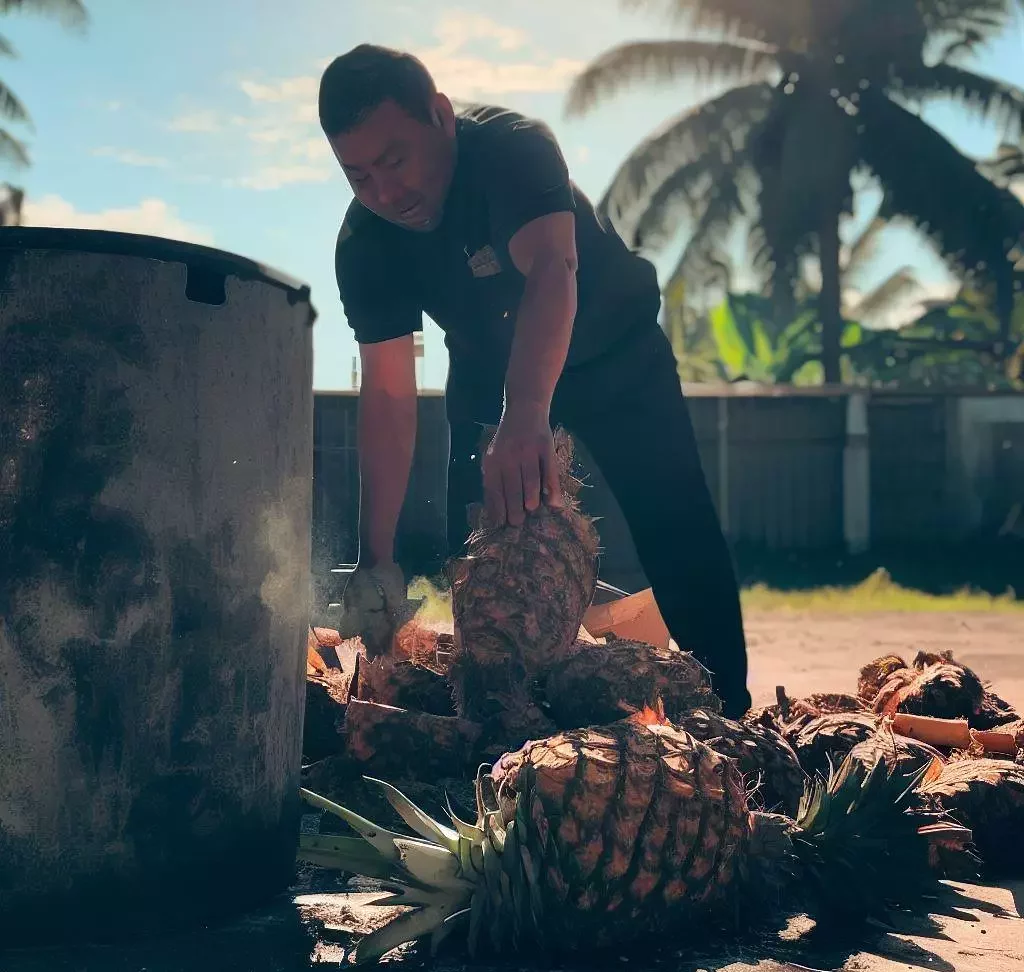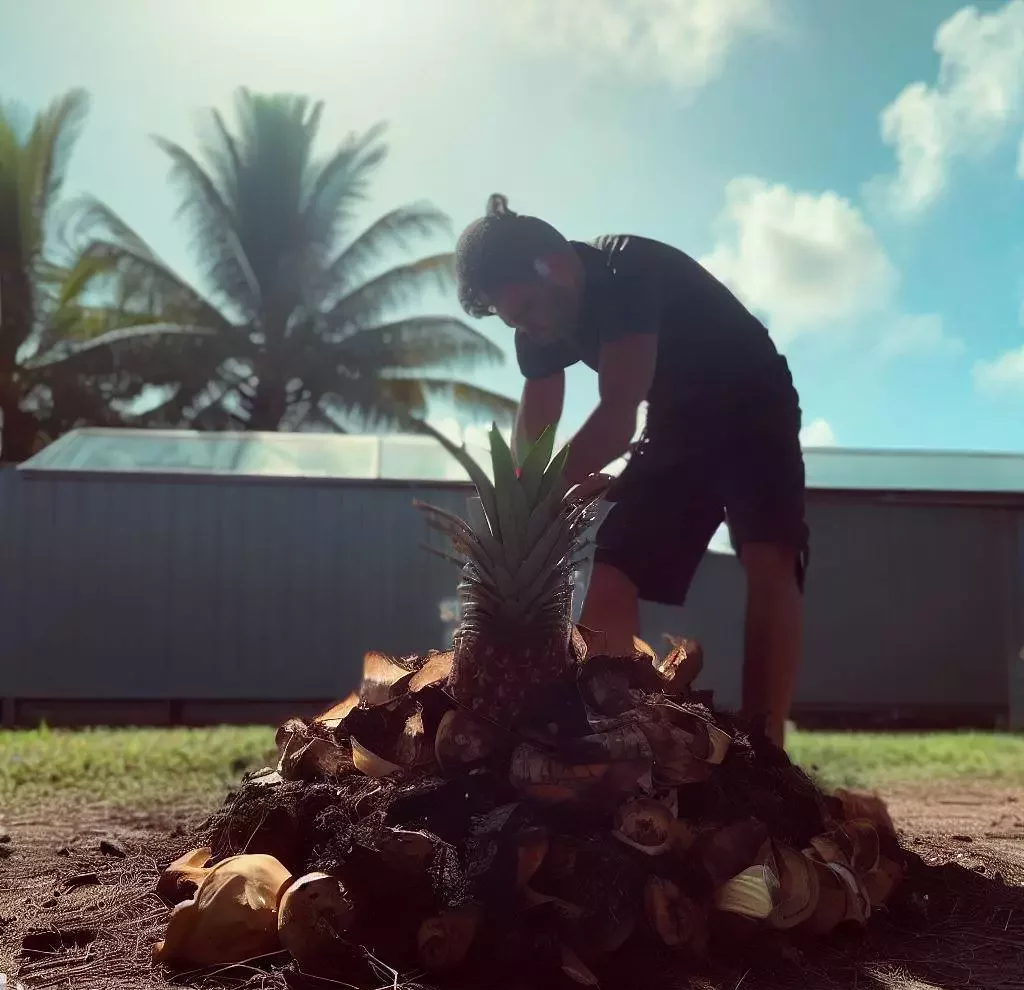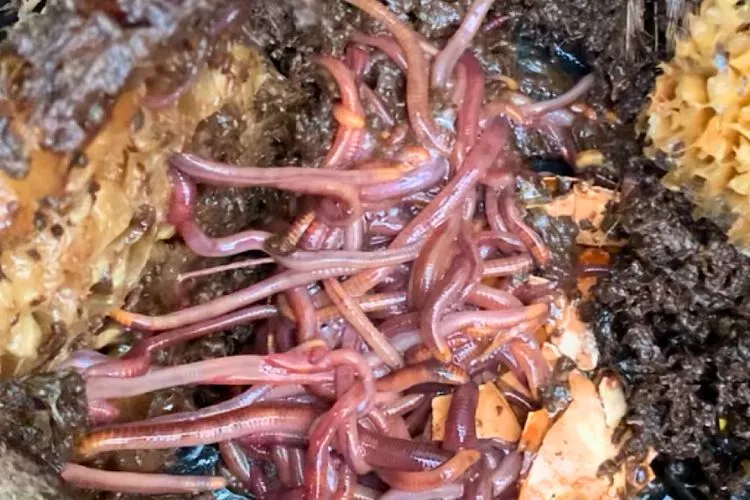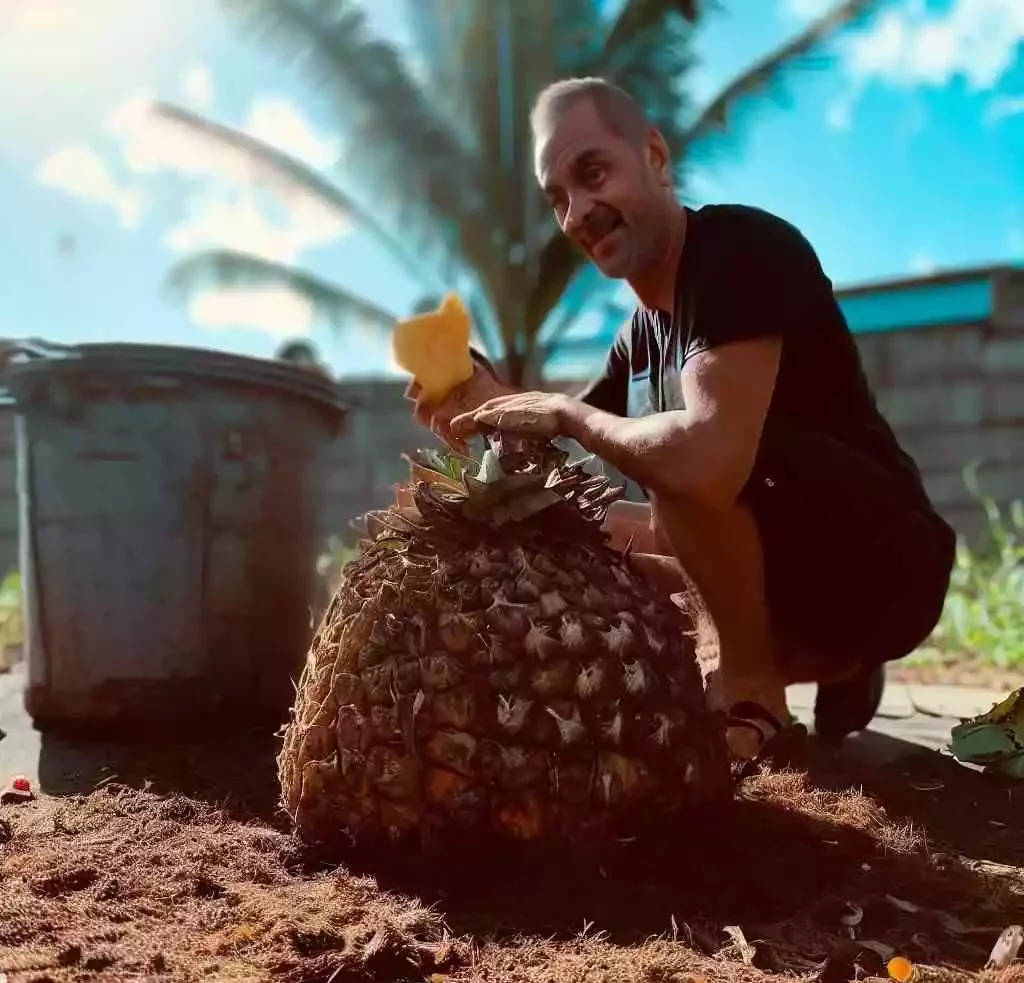Yes, pineapple can be composted. It is a great nitrogen source and adds moisture to the compost pile. However, it should be cut into small pieces before being added to the compost bin, as the tough outer layer takes longer to break down. Pineapple leaves and crowns should be avoided as they take longer to decompose. I have explained the question: can you compost pineapple? In more details below.

Can you compost pineapple?
Yes, pineapple can be composted as it is a great nitrogen source and adds moisture to the compost pile. Pineapple peels and tops are also compostable and can be added to the bin. However, cutting them into small pieces before adding them to the compost bin is recommended, as the tough outer layer takes longer to break down.
Pineapple is suitable for composting because nitrogen, an essential nutrient for the growth of microorganisms that break down organic matter in the compost pile. Pineapple’s moisture content also helps maintain the compost pile’s moisture level.
The time it takes to compost pineapple can vary depending on the size of the pieces and the conditions in the compost pile. It may take several months for a pineapple to fully decompose and turn into rich, nutrient-dense compost.
It is important to note that pineapple leaves and crowns should be avoided in the compost bin as they take longer to decompose and may not break down completely, which could lead to pest and disease problems in the compost pile. Adding pineapple to your compost bin is a great way to reduce food waste and create nutrient-rich soil for your plants.
How To Compost Pineapple?
1. Prepare the Pineapple
The first step to composting a pineapple is to cut it into small pieces. The size of these pieces will depend on how much space you have in your compost bin, but they should be no larger than an inch or so in diameter. You can use a sharp knife or kitchen scissors for this task; just be careful not to cut yourself!

Next, remove as many of the leaves as possible and discard them in another part of your yard or garden (not with other food scraps). Discard any remaining skin from around the core as well–it’s too thick and fibrous for good composting material.
2. Add the Pineapple to the Compost Bin
Now that you have your pineapple, it’s time to add it to the compost bin. To do this, spread the pieces evenly throughout the compost bin and ensure they are not too large for your worms to handle. Next, add a layer of soil or other organic matter over the pineapple pieces; this will help keep them from drying out too quickly and allow them to decompose more efficiently.
3. Monitor the Compost Pile
Once you have added your materials to the compost pile and mixed them, you must monitor the compost pile. The first thing you’ll want to do is check on its moisture levels. If they are too dry, add more water; if they are too wet, remove some water. Next, turn over or mix up your compost pile every few days so that all of its contents are exposed to air and sunlight (which helps break down organic matter).
Next comes temperature monitoring: You want your compost pile at around 130 degrees Fahrenheit (55 Celsius) when it’s ready for use in about four weeks–that’s when most of its decomposition will be complete!
Can you compost pineapple with worms?
Yes, you can compost pineapple with worms. Pineapple is a great source of nitrogen, an essential nutrient for the growth of microorganisms that break down organic matter in the compost pile. Worms are also great at breaking down organic matter and can help speed up composting.
However, it is important to note that pineapple should be cut into small pieces before being added to the worm bin. The tough outer layer takes longer to break down and can be difficult for worms to digest. It is also recommended to avoid adding too much pineapple at once, as it can cause the bin to become too acidic.

In addition, it is important to maintain the right moisture level in the worm bin. Pineapple can be a bit wet, so balance it out by adding some dry materials like shredded paper or leaves to the bin.
Composting pineapple with worms is a great way to reduce food waste and create nutrient-rich soil for your plants. Just follow the guidelines for adding pineapple to the worm bin and monitor the moisture levels to ensure the worms can thrive.
Is the whole pineapple compostable?
No, the whole pineapple is not compostable as the leaves and crown take a long time to decompose and can be difficult for microorganisms to break down. It is recommended to remove as much of the leaves and crown as possible before adding the pineapple to the compost bin.

The skin of the pineapple, while compostable, is also tough and fibrous and takes longer to break down. Cut the pineapple into small pieces before adding it to the compost bin to ensure efficient decomposition.
What fruit can not be composted?
While many fruits can be composted, a few are best avoided due to their potential to attract pests or slow down the composting process. Here are five fruits that should not be composted:
- Citrus fruits: Citrus fruits like oranges, lemons, and grapefruits are acidic and can slow down the composting process. They can also attract pests like fruit flies and ants. It is best to avoid adding citrus fruits to the compost bin.
- Pineapple: Pineapple is another fruit that can be difficult to compost due to its tough outer layer. The skin and core take a long time to decompose and can slow down the composting process. Removing as much of the skin and core as possible before adding pineapple to the compost bin is best.
- Mangoes: Mangoes are another fruit that should be avoided in the compost bin. Their tough skins take a long time to break down and can attract pests like fruit flies and ants.
- Avocado: While avocado peels and pits are compostable, they can take a long time to decompose. Cutting them into smaller pieces before adding them to the compost bin is best.
- Papaya is another fruit that can attract pests like flies and ants. Its skins and seeds take a long time to break down and can slow down the composting process.
While fruits are a great source of organic matter for composting, it is important to be mindful of which fruits you add to the compost bin. Fruits high in acid, have tough skins or cores or can attract pests should be avoided. Sticking to fruits like apples, pears, and bananas is best, which are easy to compost and break down quickly. By being mindful of what fruits you add to your compost bin, you can create nutrient-rich soil for your plants and help reduce food waste.
You May Also Find Useful: Can you compost corn husks? | Can you compost corn cobs?
Frequently Asked Questions (FAQs)
Is pineapple waste good for plants?
Pineapple waste can be good for plants as it is rich in nutrients like nitrogen and can help improve soil quality. However, it is important to compost the waste properly before adding it to the soil to ensure efficient decomposition and avoid attracting pests.
What fruit makes the best compost?
Fruits that are easy to break down and have a balanced carbon-to-nitrogen ratio make the best compost. Some examples include apples, bananas, and pears. These fruits are also less likely to attract pests and can help create nutrient-rich soil for plants.
Is pineapple skin good for compost?
While pineapple skin is compostable, it can be tough and take a long time to break down. Cut the skin into small pieces before adding it to the compost bin to ensure efficient decomposition. Additionally, pineapple skin can be acidic, so it is important to balance it by adding dry materials like shredded paper or leaves to the bin.
Conclusion:
Pineapple waste can be composted, but it is important to do so properly to ensure efficient decomposition and avoid attracting pests. While the skin and core of the pineapple can take a long time to break down, removing as much of it as possible and cutting it into small pieces can help speed up the process. Adding pineapple waste to your compost bin can create nutrient-rich soil for your plants and help reduce food waste. Just remember to balance it with other organic materials and monitor the compost for any signs of pests or odor. If you were wondering can you compost pineapple or not, I hope I have been able to clear your confusion.


